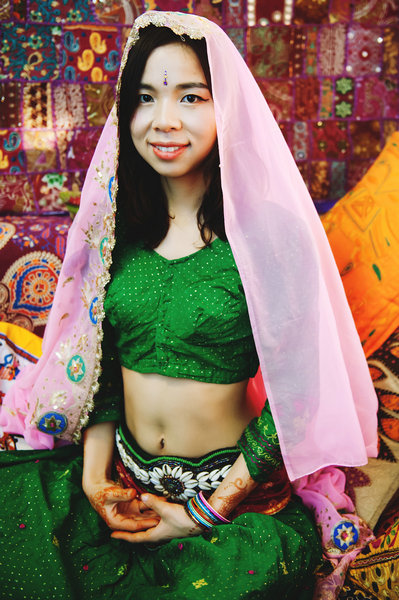Deep impressions of living as they used to
Updated: 2016-06-04 13:03
By Xu Lin(China Daily)
|
||||||||
 |
|
[Photo provided to China Daily] |
A body artist finds tranquility in hutong living.
One of the best ways to get to know Beijing is to stroll through its hutong and chat with locals.
The main street of Nanluoguxiang, lined with shops, also boasts 16 hutong on both sides, where you can experience like Beijingers and trace the city's history via ancient residences.
Some outsiders choose to become a tenant or a frequent visitor, to know about the authentic hutong life. One of them is Li Mei, 26, a henna artist who sought tranquility in bustling Nanluoguxiang.
"For me, living in a hutong means real life," she says. "It's a place boiling with humanity. My neighbors are friendly and honest."
She opened a small henna studio last year in a hutong in the area and works and lives in a small cozy room decorated with traditional Indian paintings and green plants in colorful vessels.
Henna is a temporary form of skin decoration that originated in ancient India. In India and its neighboring countries such as Sri Lanka, people apply henna designs on their hands, feet and back on festive occasions, including weddings and traditional ceremonies.
In the spirit of the Chinese saying that "a distant relative is not as good as a near neighbor", Li gets on well with her neighbors.
They chat often and the neighbors teach her about gardening. Sometimes they share home-made dishes such as zhajiangmian, or fried sauce noodles with her. While she is away they look after her studio.
"You could never experience that kind of life if you live in a high rise," she says.
The ringing bell of a bicycle suddenly cuts her short. A middle-aged man stops at her door and chats with her for a while. This is a common sight in the hutong, where it is routine for residents to drop by and natter away.
Quiet time
It is a relatively quiet hutong. For her, the various voices she hears every day are all about life-common but real. They include Buddhist music in her studio, birds singing, a passerby who is on the phone having an argument and a pedicab driver recounting a tale to his customers.
Some neighbors are interested in the exotic henna art and she painted henna once for one of them. She carefully paints on the skin with a cone-shaped tube filled with henna paste, a dye made from the powdered leaves of the henna plant.
"I want to combine meditation with painting and teach city dwellers to have peace of mind, so they can paint out their inner thoughts," Li Mei says.
In 2013 she left her hometown in Hunan province and became a Beipiao, or Beijing drifter, which refers to those who struggle to make a living in the capital.
- Suspected IS terrorists arrested in Germany
- Japanese boy abandoned by parents in Hokkaido forest found alive
- China to build Africa's biggest university library
- 'Kill list' found in UCLA campus shooter's residence: Police
- Swiss declare Alps tamed as Gotthard rail tunnel opens
- China urges Japan to properly settle Chinese forced laborers issue

 Students use creative ways to relieve gaokao stress
Students use creative ways to relieve gaokao stress
 Frederik the Great: Is it a horse or a stunning statue?
Frederik the Great: Is it a horse or a stunning statue?
 How mahjong can improve your chances with English
How mahjong can improve your chances with English
 Shanghai's 3D printing expo attracts over 100 companies
Shanghai's 3D printing expo attracts over 100 companies
 Traditional incense production in Nyemo county, China's Tibet
Traditional incense production in Nyemo county, China's Tibet
 Performers wanted for Shanghai Disney park
Performers wanted for Shanghai Disney park
 New law protects ancient villages in Southwest China's Lhasa
New law protects ancient villages in Southwest China's Lhasa
 Kids with HIV in Shanxi's Red Ribbon School
Kids with HIV in Shanxi's Red Ribbon School
Most Viewed
Editor's Picks

|

|

|

|

|

|
Today's Top News
Chinese State Councilor Yang Jiechi to meet Kerry
Chinese stocks surge on back of MSCI rumors
Liang avoids jail in shooting death
China's finance minister addresses ratings downgrade
Duke alumni visit Chinese Embassy
Marriott unlikely to top Anbang offer for Starwood: Observers
Chinese biopharma debuts on Nasdaq
What ends Jeb Bush's White House hopes
US Weekly

|

|









